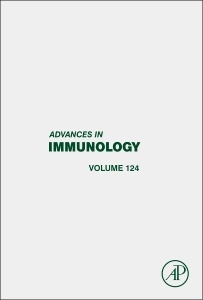Description
Advances in Immunology
Advances in Immunology Series
Coordinator: Alt Frederick W.
Language: English
Subject for Advances in Immunology:
Publication date: 08-2014
308 p. · 15x22.8 cm · Hardback
308 p. · 15x22.8 cm · Hardback
Description
/li>Contents
/li>Readership
/li>Biography
/li>Comment
/li>
Advances in Immunology, a long-established and highly respected publication, presents current developments as well as comprehensive reviews in immunology. Articles address the wide range of topics that comprise immunology, including molecular and cellular activation mechanisms, phylogeny and molecular evolution, and clinical modalities. Edited and authored by the foremost scientists in the field, each volume provides up-to-date information and directions for the future.
- Group 2 Innate Lymphoid Cells in the Lung
Li Yin Drake and Hirohito Kita - The Ubiquitin System in Immune Regulation
Yoon Park, Hyung-seung Jin, Daisuke Aki, Jeeho Lee and Yun-Cai Liu - How Immunoglobulin G Antibodies Kill Target Cells: Revisiting an Old Paradigm
Markus Biburger, Anja Lux and Falk Nimmerjahn - A Transendocytosis Perspective on the CD28/CTLA-4 Pathway
Blagoje Soskic, Omar S. Qureshi, Tiezheng Hou and David M. Sansom - How to Trigger a Killer – Modulation of Natural Killer Cell Reactivity on Many Levels
Carsten Watzl - Roles for Helper T Cell Lineage-Specifying Transcription Factors in Cellular Specialization
Amy S. Weinmann - MHC Class I Recognition by Monocyte/Macrophage-Specific Receptors
Ryotaro Yoshida - Regulation of Regulatory T Cells: Epigenetics and Plasticity
Masahiro Okada, Sana Hibino, Kazue Someya and Akihiko Yoshmura
Immunologists and infectious disease specialists, cell biologists and hematologists.
Frederick W. Alt is a Howard Hughes Medical Institute (HHMI) Investigator and Director of the Program in Cellular and Molecular Medicine (PCMM) at Boston Children's Hospital (BCH). He is the Charles A. Janeway Professor of Pediatrics and Professor of Genetics at Harvard Medical School. He works on elucidating mechanisms that generate antigen receptor diversity and, more generally, on mechanisms that generate and suppress genomic instability in mammalian cells, with a focus on the immune and nervous systems. Recently, his group has developed senstive genome-wide approaches to identify mechanisms of DNA breaks and rearrangements in normal and cancer cells. He has been elected to the U.S. National Academy of Sciences, the U.S. National Academy of Medicine, and the European Molecular Biology Organization. His awards include the Albert Szent-Gyorgyi Prize for Progress in Cancer Research, the Novartis Prize for Basic Immunology, the Lewis S. Rosensteil Prize for Distinugished work in Biomedical Sciences, the Paul Berg and Arthur Kornberg Lifetime Achievement Award in Biomedical Sciences, and the William Silan Lifetime Achievement Award in Mentoring from Harvard Medical School.
- Contributions from leading authorities
- Informs and updates on all the latest developments in the field
© 2024 LAVOISIER S.A.S.
These books may interest you

Advances in Immunology 153.10 €

Tumor Immunology 166.19 €

Advances in Immunology 153.10 €

